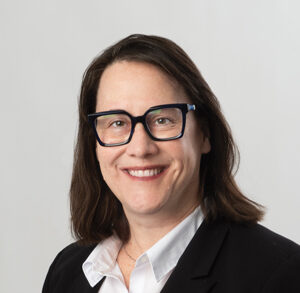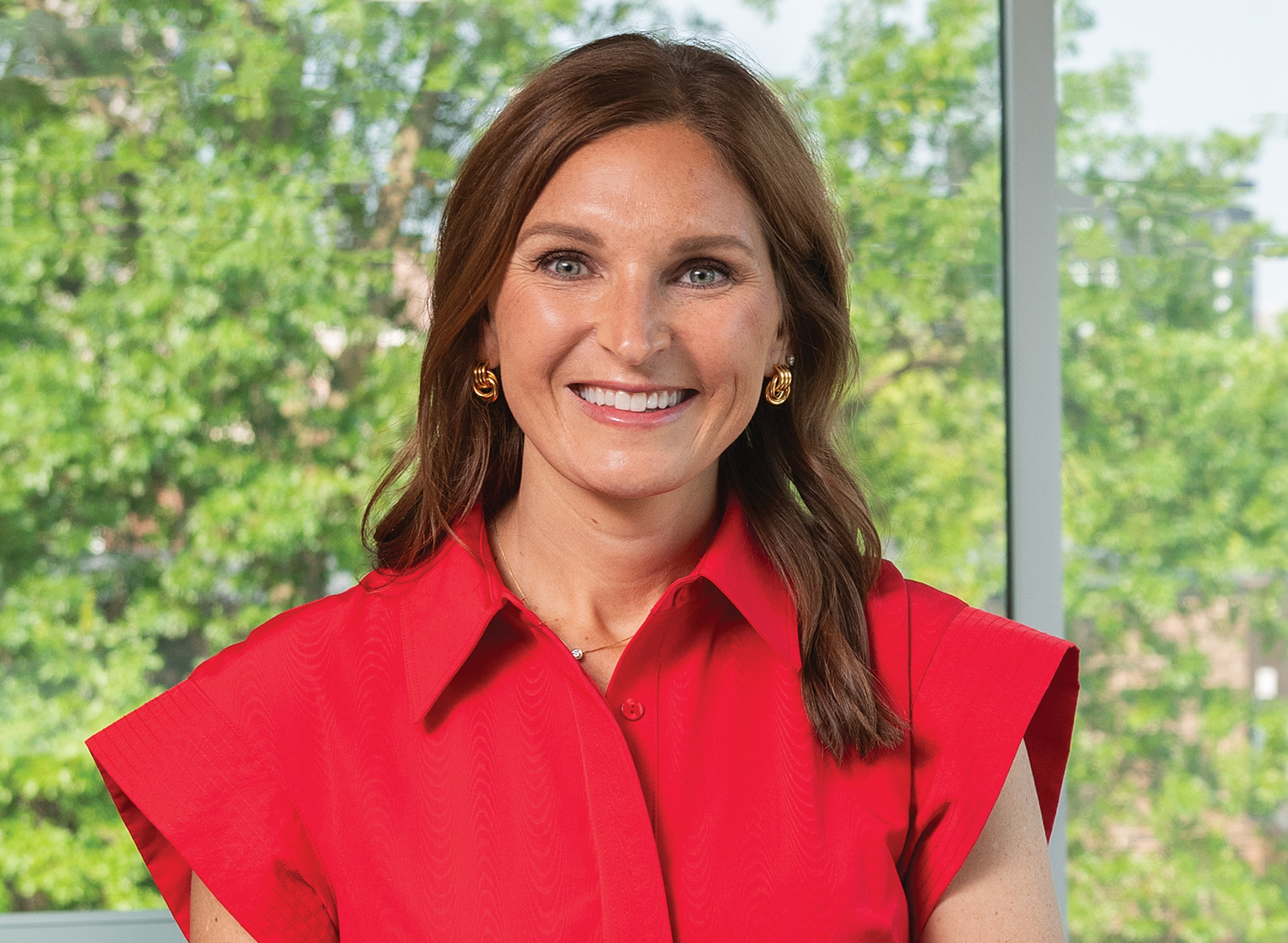A Closer Look: Julie Kenney
CEO, Agribusiness Association of Iowa

Gigi Wood Jun 20, 2025 | 6:00 am
14 min read time
3,326 wordsA Closer Look, Ag and Environment, All Latest News, Business Record InsiderThe Agribusiness Association of Iowa gained a new leader on Sept. 1, when Julie Kenney stepped into the role of CEO. She has more than 20 years of experience in agriculture, most recently serving as the deputy secretary of the Iowa Department of Agriculture. Kenney stepped into the position following the death of past CEO Bill Northey in February 2024. Northey served as Iowa’s Secretary of Agriculture from 2006 to 2017.
Kenney, who grew up on her family’s farm in Lohrville during the 1980s, has seen the tougher side of the agriculture industry. Today, she lives in Story County with her husband and children, where they raise corn and soybeans on their family farm. Her new role allows her to give back to that industry, she said.
The AAI was formed in 1994 with the merger of the Iowa Grain & Feed Association and the Iowa Fertilizer and Chemical Association. The AAI lobbies for legislative and regulatory issues important to the agricultural businesses that serve farmers.
Kenney recently sat down with the Business Record to talk about her new role at the association, her goals for the position and the challenges facing the agriculture industry in Iowa. Her responses have been lightly edited for clarity and length.
Can you talk about the role of the Agribusiness Association of Iowa?
One of the things I love about AAI is it represents the entire ag value chain here in the state of Iowa. When you think of input providers, seed crop protection products, fertilizer products, all of those manufacturers would be our members. Everything from startups to large multinationals. It’s ag retail, grain processing and handling, the livestock industry, feed, fertilizer, everything to the other end of the value chain, which would be the Cargills of the world, grain processing, AGP. It’s a good viewpoint and picture of ag in Iowa. Obviously, farmers are a huge component, they’re the customers of the people that we serve, so we focus on advocating on their behalf, a lot of times legislatively. We offer a number of training opportunities where their employees can get the latest information on grain grading, for example, or the safety of the fertilizer products that they’re handling.
I often think of the ag industry in Iowa as a small town; everybody kind of knows everybody. What we try to do is foster more of that networking and collaboration. Sometimes it’s in informal ways; we host a number of golf outings in the summer. We host an agribusiness showcase and conference in February.
How does the association fit into the state’s agriculture industry?
We’re all facing the same kinds of challenges, but from different angles. We have, and need to continue to have, great relationships with all of the commodity groups, so corn, soybean, Farm Bureau, of course, all the livestock groups. If it’s a livestock issue, we’re mostly looking at it from a feed perspective or an ag retail perspective, and then those groups are looking at it from the farmer or producer perspective; same issue, different angles.
A lot of times, when we work together, we can solve it better by having those perspectives represented at the table. We have a great collaboration with the Iowa Department of Agriculture and Land Stewardship, with DNR, with the DOT; those would be the primary state agencies that would impact our members. We’re working with them on policies and regulations, but also making sure that Iowa is represented on a national stage. How do we make sure that Iowa ag is represented in Farm Bill discussions, for example, or funding discussions that are happening at the federal level, or USDA or EPA programs?
Farming in northern Iowa looks very different than southern Iowa, and we need to think about it differently. Ag in Iowa looks really different than the southern U.S. or the coast, and so we in Iowa have to band together to make sure that how it works here is represented in those conversations with our representatives in Washington, D.C., and with all the national associations that we work with, too. There are a lot of different facets to it. I think that’s part of what makes this job so interesting, there’s always something different. There are different challenges to figure out for lots of different interested parties. When there is a proposed bill across the street at the Capitol, how might this impact ag retail? How might this impact small ag retailers versus large ag retailers? How can we find a consensus that works for all and then advocate for that? It’s a great opportunity, once you figure out that network and the influencers within that, and the members within that, to figure out how they best represented, and then go advocate for that.
That dovetails into my next question, what brought you to this position? You’ve worked in many agribusiness positions, most recently as deputy secretary of the state’s agriculture department. What stood out about this position?
Yeah, I came here from the Department of Ag, and that was a phenomenal experience. All of the things that the department touches, it’s a really wide area of responsibility; there’s a really wide area of things that they’re advocating for. It is a lot of the same issues that we advocate for here, it’s just from a different perspective. During those five years, we managed a whole lot of really tough issues, as did association members. When you think about COVID, supply chain disruptions, a derecho, drought, severe flooding on the western side of the state, those five years from 2018 to 2023 felt like a unique time because there were so many really widespread issues.
I was in the trenches working on them, and when this opportunity came up, it was a way to continue to work on those issues, but from a different perspective and a different angle. At the ag department we were trying to represent the entire ag community. So that is everything from farmers to the businesses that support them, rural communities. This association is more of a subset of that. You can really dig into specific areas that are important to them and the businesses that we represent.
I think one of the things I didn’t fully appreciate before getting here is how hugely important association members are to ag, to our economy and our rural communities. A lot of us on staff make it a point to go out and meet with those members, and when you pull into a small town, sometimes the ag retail location is the center of the town. It’s where people are gathering for coffee. It’s where they come in and do their business. It’s where they’re getting their market information. They’re providing the products and the services and they’re just such an integral part of those rural communities. Having grown up in one of those, I just feel an engagement and a responsibility to help continue that, to help advocate for them, to continue that impact that they make in those communities all across the state.
How does this work connect with your personal purpose or how you grew up on a farm?
My family lives in Story County, outside of Nevada. That’s where my husband grew up, so he’s also a farm kid. My family’s farm is still outside of Lohrville. My brother Mark still farms it. Mom still has the grounds. Mark’s family, he’s the fifth generation to farm there, so he’s a full-time farmer. I do it from this angle. We have the full breadth of ag, even within our family. Both of us growing up in it – it’s such a culture. You learn how to work hard. I was an ’80s farm kid. The 1980s Farm Crisis wasn’t super fun. It was tough. It was really, really tough. And I think I didn’t fully recognize how tough it was because everybody in our community was impacted. All of our neighbors were impacted, all of my friends’ families were impacted. I think we all just pushed through, but it taught us how to be resilient. It taught us how to work.
It taught us how to appreciate what we have, and that hard work really matters, and banding together as a community really matters, caring for your neighbors, and that’s still true today in ag. I can’t see myself not being in ag because of that. It’s just such a part of my personal fabric. It’s a part of my family’s fabric. It has been for generations. I believe in it. I think we have so much to celebrate here in Iowa. Yes, we diversified, and we need to diversify into insurance, and all of these other businesses, which is fabulous and great, but ag is the heart of our economy, and it probably always will be. I hope it always is. So I hope that by working with the great team here and our great members, we can make sure that ag businesses continue to be a really big part of that, and the places where I grew up and where we farm continue to thrive and continue to have opportunities. When I think about our members, there are lots of people who want to farm. Maybe they can’t farm, but by working for one of our members, they’re connected to it. They’re supporting ag, they’re supporting farmers. They’re continuing what they believe in and what they’re a part of. In turn, I want to help support them.
What are the top priorities for the association? There is so much activity going on in the agriculture industry, it seems like the list could be endless.
Yes, it is. Part of the responsibility, then, is prioritizing and focusing. Everything in the state touches ag. We could chase our tails all day long and never make an impact. So every year, there’s a whole process where we go through to figure out, what are our priorities and what are we going to focus on? And that has to come from members. We will get our legislative committee together, and we will talk about what happened during this legislative session, how do we want to plan for the next one, all of those issues which really kicks off the process for developing priorities for the 2026 legislative session.
This year, some of the things that we heard from members were workforce continues to be a challenge. What are things that we can do that help bridge that gap? What are policies that we can support that help bridge that gap? What are just broad things that help businesses grow and thrive?
Tax policy, regulatory policy, those kinds of things come up when you talk about ag issues that impact everybody. How do we protect our natural resources, soil and water? It may not be obvious to everyone, but our members play a huge role in that, too, because they’re helping farmers implement conservation practices across the state. One of the things that I think we have probably always advocated for is making sure that there’s funding to provide resources to farmers to implement those conservation practices. That was a priority for us this year. I’m guessing it will be for next year, really implementing the nutrient reduction strategy, and ag retail has a huge part in that. Agronomists are the trusted advisers for farmers, so they’re helping them think through what works on each farm. How do we make sure that you’re productive, but also conserving your most critical resource, which is the farmer, soil and the water around it. Because we care about our communities, we care about what we’re feeding into, communities like Des Moines, all of those things. There are lots of issues, but if there were some themes, they would center around workforce, enabling business growth and protecting our natural resources.
When U.S. Secretary of Agriculture Brooke Rollins was here in March, were you able to speak with her?
Before she spoke at the Ag Leaders Dinner, we had a very small roundtable discussion with her. The chairman of our board represented AI. It was maybe 10 people or so that sat down with her and talked about what was important. It was an opportunity for her to share, and she had just gotten on the job, I think it was like 90 days or less, so she was talking a lot about what her focus was at USDA. But it was also an opportunity for us to ask about all of the issues that we’re thinking about.
It’s no secret that there’s a lot that’s uncertain right now around ag, so people were asking about trade and tariffs. They were emphasizing the importance of export markets. We have a population of 3 million people. We produce for a whole lot more than that, we have to have these export markets. So talking about the need for certainty, the need for swift action as it relates to that, the need for free trade agreements, keeping those markets open. We talked about how livestock is a huge priority here. How do we protect animal health and address things like foreign animal diseases? How do we make sure that we keep those diseases out of here, protect animal health, make sure that there’s appropriate resources, both from the federal government and the state side, to make sure that we’re protecting our herds and our flocks, because that matters to us.
We talked about natural resources. A lot of that funding comes from USDA. Natural Resources Conservation Service helps support conservation practices, the need for that as they’re looking at their budget and government efficiency. We wanted to make sure to emphasize to her the things that are important to Iowa that we must maintain. I think the reception was positive and we need a strong advocate at USDA, because there are so many issues that the industry is facing right now.
Does the association have any role in the tariff conversation?
Again, it’s more from a need for certainty. As businesses plan and as businesses look forward, the crops are in the ground now, so a lot of members are thinking about how to get through this crop season. But they’re planning for the next season, and they’re thinking about importing the raw goods that they’re going to sell to their farmers. They’re thinking about their grain handlers. They’re thinking about how to maintain those export markets, what do we have access to? So it is sharing the message that we need certainty, that we appreciate the work to open new markets. We are in a different position economically than we were during the first Trump administration, when they started on this path, so making sure that they understand that the ag economy is much tougher now. While a lot of our members understand the goals and objectives of that, it’s also important for the administration to understand that times are tougher and we need action sooner, because, again, we’ve got to have that certainty. We’re not on as solid a footing as we were during the first Trump administration from an ag economy perspective.
How much of a problem have livestock diseases been for your members?
Livestock is a huge part of our economy, even for our members who aren’t actively engaged in the livestock, per se. They’re providing a lot of the feed, or they’re handling the grain that then goes into the feed for them. It’s really important to us. I don’t know that I would say it’s a heightened alert, or more important now than it was before. The state and the industry have been fighting highly pathogenic avian influenza since 2015. We continue to have cases in the state of Iowa and other states. We’ve learned a lot. I know the state has gotten better. I know farmers have gotten better at the response and the management of it. There are lots of diseases that we’ve kept out of Iowa and kept out of the United States.
Part of what we focus on is, what are those best practices around biosecurity? How do you make sure that we are protecting those farms and protecting animal health and those markets? Sometimes that’s working on specific policies or preparedness plans. Sometimes it’s making sure that there’s appropriate funding for IDALS, for USDA, Animal and Plant Health Inspection Service that is providing support to farmers and the businesses that support them when they are fighting through these challenges. It’s something that we always have to raise the bar on every single day. Our members will be better prepared tomorrow than they were today, and they have to be. We’re never done.
For this role, do you have any goals moving forward, things that you’d like to do with this position?
I think it is absolutely critical for someone in a role like mine to be out meeting with members across the state. You can’t appropriately advocate for someone if you don’t understand what they’re dealing with, what the challenges are that they’re facing, what’s going really well that we need to protect and what are some things that we need to fix. I don’t know that we will ever get to a place where we have it all figured out. I’m new, so I have been making a very concerted effort to be out and about, but I think going forward, I’ll always continue to do that, because things are always changing, and people have such different perspectives on things. Oftentimes, I’ll hear about it from two or three different members, and then I’ll ask another member that question, and they’ll have a little different perspective, which helps me think about the issue in a more holistic way and try to find a solution that, again, works for all or many of the members.
It’s such a diverse membership that we’re representing that I think it’s always going to be dynamic. There’s always going to be different challenges, different areas of focus, and if you’re sitting in Des Moines all day, every day, you miss that. A lot of our work happens here, a lot of our work happens across the street at the state Capitol, but if we’re not out in places like Estherville or other areas of the state, you miss that.
Are there any issues you would like the Central Iowa business community to know about?
I think as a state, we are always better off when we try to see things from other people’s perspective. As a business community, the more we can network and learn from each other, the better. Also, I would encourage them to go out to some of these rural communities, get to know some of the business leaders who aren’t in downtown Des Moines, get their perspective on things and vice versa.
I think we’re always better when rural and urban are working together. And I think there are countless examples of where that has gone really well. When we stop talking and stop sharing experiences and stop working for the betterment of the state, things can break down. I think ag needs to better understand some of the issues that the business community – that’s not directly tied to ag – is facing and vice versa. How do we grow the collective pie of the economic engine of Iowa together? I hope the insurance community grows here. I hope ag grows here. I hope every sector that we’re trying to grow grows our economy, because that’s better for everybody. It’s easy for all of us to get insulated in the direct things that we’re working on and facing, but if we can network with that broader business community, we’ll be better off.
At a glance
Hometown: Lohrville, Iowa
Education: Bachelor of Arts in marketing from Simpson College
Family: Husband, Mark, and two children
Contact: jkenney@agribiz.org

Gigi Wood
Gigi Wood is a senior staff writer at Business Record. She covers economic development, government policy and law, agriculture, energy, and manufacturing.










